If you read my review on Max
Fleischer's "Rudolph the Red-Nosed Reindeer" short then you
already know that it was my first exposure to both the character of Rudolph and
the song. But what I didn't tell you was that I didn't see the short in full
until later on during my childhood after I saw the
Rankin/Bass stop-motion special, since only clips of it were shown on the
“Disney Sing Along Song” video "Very
Merry Christmas Songs". However, the stop-motion special wasn't the
first version of Rudolph that I saw from beginning to end either. The first
time I ever watched a Rudolph film of any kind, was oddly the one released by
"GoodTimes Entertainment".

This was the only film that "GoodTimes Entertainment" released theatrically being that their forte was usually creating low-budget straight-to-video animated film mock-busters. The reason for the studio not making films that are more theatrical after this was that the film did not do well with audiences and critics. I remember watching the film a lot as a kid with my brother Jesse, as well as seeing merchandise for it at some of my local retail stores. Unlike how I outgrew most of the films I watched when I hit Middle School when the art of film was starting to impress me, my copy of the film broke for unknown reasons. Over the years, I've seen this film on worst Christmas movies list, and based on my memory of the film, my reactions to it were exactly how I felt about people's perception to the animated "Babes in Toyland" movie. Since I just previously looked into an obscure adaptation to a Christmas classic that I remember seeing during my youth, I thought I may as well take a look at this film as well to see if there's anything in it that holds-up or possibly does better than the Rankin/Bass special. ON WITH THE REVIEW!
Rudolph is a reindeer who is born with a shiny red nose that glows, which causes the reindeer and the elves to laugh at him and dismiss him. Fed up with all this cruelty after being banned from the reindeer games, Rudolph runs away where he makes a few friends along the way who lovingly accept him. Eventually during the journey, Rudolph and friends’ cross-paths with an evil Ice Queen who hates Christmas, and uses her magic to create the worst snowstorm in history to prevent Santa from making his rounds. Just by reading my synopsis of the plot, I am sure a lot of you can pick-up very quickly that this is following the exact same story structure as the classic Rankin/Bass special. And to be fair, extending a brief story into a full length movie after coming out decades when the iconic Television special of "Rudolph" had been released is far from easy to make. It practically seems unavoidable for any animation studio to extend the story of Rudolph to over an hour and not take a few elements from its predecessor given how limited the source is. With that said, though there are differences in the story when comparing it to the original. Anyone who's seen the original classic can tell which direction that this film is going by beat-by-beat leading to very little surprises, especially when the film itself is also a musical and that there are characters who's arcs and motives are very similar to the classic characters that we know and love.
Rudolph is a reindeer who is born with a shiny red nose that glows, which causes the reindeer and the elves to laugh at him and dismiss him. Fed up with all this cruelty after being banned from the reindeer games, Rudolph runs away where he makes a few friends along the way who lovingly accept him. Eventually during the journey, Rudolph and friends’ cross-paths with an evil Ice Queen who hates Christmas, and uses her magic to create the worst snowstorm in history to prevent Santa from making his rounds. Just by reading my synopsis of the plot, I am sure a lot of you can pick-up very quickly that this is following the exact same story structure as the classic Rankin/Bass special. And to be fair, extending a brief story into a full length movie after coming out decades when the iconic Television special of "Rudolph" had been released is far from easy to make. It practically seems unavoidable for any animation studio to extend the story of Rudolph to over an hour and not take a few elements from its predecessor given how limited the source is. With that said, though there are differences in the story when comparing it to the original. Anyone who's seen the original classic can tell which direction that this film is going by beat-by-beat leading to very little surprises, especially when the film itself is also a musical and that there are characters who's arcs and motives are very similar to the classic characters that we know and love.

What makes it even more obvious that the film is relying too heavily on stealing from the Rankin/Bass special is Rudolph's voice. At first when we see him as a child, his young voice sounds energetic and full of spirit, which gives the character his own distinct voice and personality. But then when we see him grow a little older, right when he's about to enter the reindeer games mind you, he now suddenly has a hazy voice that’s very identical to the voice Rudolph had in the 1964 version. In fact, the same actress (Kathleen Barr) they casted to voice Rudolph was picked to voice the Rankin/Bass Rudolph in straight-to-video CG animated sequel "Rudolph the Red-Nosed Reindeer and the Island of Misfit Toys" (that was also strangely distributed from "GoodTimes Entertainment"). Rudolph's personality at that point isn’t much different either, probably because he goes through the same arc. He's sad and lonely when being shunned by society; shows some joy when being around his new friends; and acts heroic when we reach the climax. The only difference between him and any other version of the character is that he's a little more confident, which is nice to see but makes him a little bland. I wouldn't mind if it happened after he confronts his problems and learns the benefit of his nose, but before that he's already shown to be acting brave, tough, and excited whether it's participating in the games, facing a bully, or during his encounter when making new friends. He will have a good cry here and there when being made fun of, but the overall tension that he is supposed to have among the people who dismiss him does not feel nearly as intimidating since he’s not as socially awkward as the other versions of the character are.
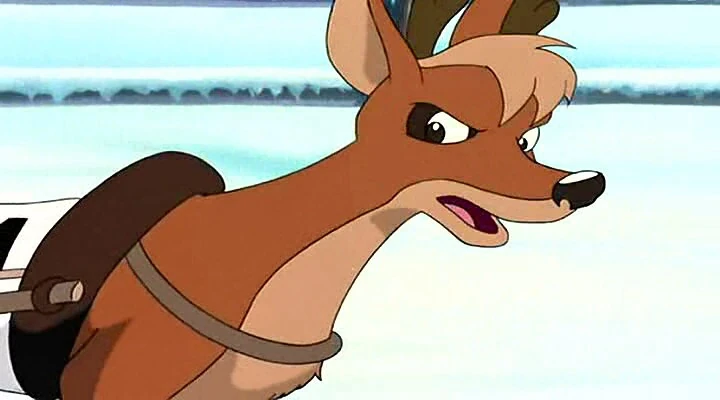
When you get down to it, with the exception of everyone's first reaction to Rudolph's nose when he was a baby, the only person who makes a big fuss out of his nose is a jock bully reindeer named Arrow. All of Rudolph's problems come from this one character. The reindeer in Rudolph's class behave as if his red nose is not a big deal, until Arrow starts mocking him, which causes the others to call him names. And has Rudolph thrown out of the reindeer games by making him mad enough to accidentally shine his red nose at him after telling him a heartbreaking lie while cheating (and yet for some reason nobody notices it, and he wins by default even though he crashed as Rudolph's love interest Zoey was right behind Rudolph at the finish line. So why isn’t Zoey the winner?). If Arrow didn't intentionally stir things up, Rudolph wouldn't be having as many problems with everybody regarding his nose. Why, because Rudolph is practically good friends with plenty of the North Pole’s inhabits. His father is a little more supportive and nicer than the previous version (not to say that his Dad here doesn't act hesitant at first, or says something extremely hurtful behind Rudolph's back after being booted off the games); has an elf friend who drives Rudolph in the race and tries to comfort him when things are down; has a love interest who has the freedom to be with him; and even Santa, the big guy who runs the North Pole shows a close connection with him (which is ridiculous that he isn't the judge at the Reindeer game, or can't simply tell the judge's to keep him in because he's the guy in charge of everything, but come on, something has to lazily move the plot forward). Compared to any of the two versions of Rudolph, this one has it better than the others do. I'm not going to pretend that the writing towards Rudolph's bullying in the Rankin/Bass Special didn't feel forced and rushed. But in the very least you still felt connected to Rudolph's struggles as a misfit for having no friends, not being allowed to be with his love interest, and having a difficult relationship with his Father for how he cares more about getting him to be part of Santa's team than showing emotional support. Rudolph's problems here are just mainly because of one person as opposed to a stuck-up society who cannot accept others that are different.

Arrow is not just a bully who lies, cheats, and mocks Rudolph; he is also the obstacle to keep Zoey from being with Rudolph, who honestly is not much of a threat in that aspect. Unlike how Clarice wasn't allowed to be with Rudolph because her father forbids it, Zoey has the complete freedom to break-up with Arrow to be with him. She's not restrained by an authority figure, which only begs the question why she is with Arrow in the first place? She doesn't seem to be the kind of doe who would go for the bad buck for how kind and sweet she is, so what does she see in a reindeer who cares only about himself? On top of it, she shows absolute love and feelings for Rudolph than she does Arrow, if anything she seems unhappy with him, and yet she waits until Rudolph runs away to express her true feelings for him. After hearing the news, rather than trying to get help to find Rudolph, she goes out on her own and becomes responsible for starting the storm of the century that could cancel Christmas (acknowledging the risks of her action). Her personality may be as charmingly pleasant as Clarice was, however, that isn't enough to overlook how idiotic the writing surrounding her is.
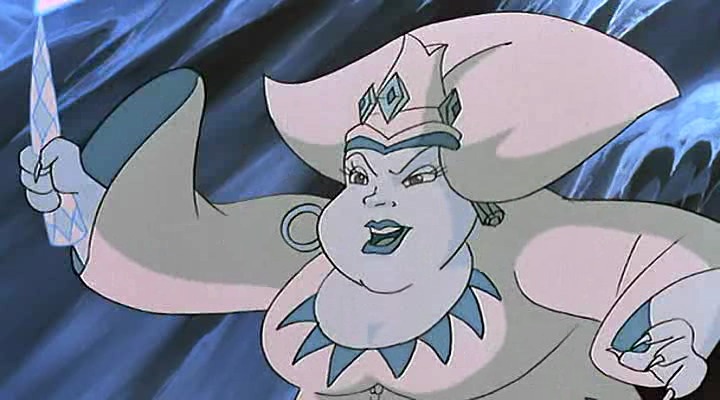
And just when you think the writing can't get any more brainless, the villain's motives and how she carries out her plan is some of the worst writing I've ever seen regarding a villain! Stormella is a queen (only by name, not because she’s an actual ruler) who practices magic in her ice castle, and hates Santa. Why does she hate Santa? Just because. I know Bumbles had no reason to hate Christmas either, but he was simply a savage beast who terrorized the North Pole and ate whatever tasty morsel he could find. Stormella is a North Pole resident who's as powerful and respected (or more appropriately feared) as her rival, where she seems worthy of a foe to have a legitimate reason for hating him. Maybe she hates Santa for running the North Pole and that she wants to take it away from him; or perhaps that she's jealous that Santa is more popular than her, and wants revenge. But no, she just hates him because she can't stand his kindness. And as much as she hates him, she for some reason lets him and his elves use her bridge (or bridges) to get the mail at the other end of the North Pole. This gets more puzzling when after Santa refuses to give up the elves that accidentally destroyed her ice garden; she closes her bridge to the public. If she can close her bridge whenever she feels like it, why hasn't she done that before, or why even allow it at all if she isn't working for Santa? It's her property after all. Besides how is closing her ice bridge going to cut Santa off from receiving his mail? Did Santa forget that he has reindeer that can fly; getting an elf on a sleigh pulled by one reindeer that can fly at the speed of light seems more efficient than driving miles out on a snow-sled. Furthermore, it doesn't seem to pose as a problem after Stormella closes it. But wait Stormella's plan gets even better, because she vows that if anyone crosses it, she'll start the biggest snow storm in history that could bury the North Pole. Why bother waiting, or have a reason to start a snowstorm given that she appears to have no heart. If she has the power to destroy Christmas and blow-Santa away (she can also instantly freeze things as well), why not use it? And when she does start the snowstorm, it doesn't look anywhere near as bad as it was build-up to be, it just looks like a typical heavy snowfall. To cap-off this half-baked writing, Stormella gets saved by Rudolph and decides to let him go, which comes across as completely random that she now shows signs that she has a bit of a heart after given no evidence of it earlier. But the randomness continues when there's suddenly a North Pole law that she has to grant Rudolph a wish for saving her. And what does Rudolph wish for, he just wishes her to be nice, where she magically changes herself into a goodie two-shoes. Bumbles redemption may have happened out of nowhere, but this is worse. She doesn't suddenly change from an act of a good deed (where you think that's the direction that this film is heading for), but simply from the act of brainwashing, giving Stormella no free will of her own where she's forced to be good for the rest of her life. It's such a pity that this villain is so poorly written because Whoopi Goldberg gives a performance as villainously over the top as someone like Tim Curry or Christopher Plummer would give to such a character. Her sassy diva personality is just tons of fun to listen too while also coming off as a bit menacing, and the design for the character is not bad either. It infuriates me that all this potential is wasted from such dreadful writing!
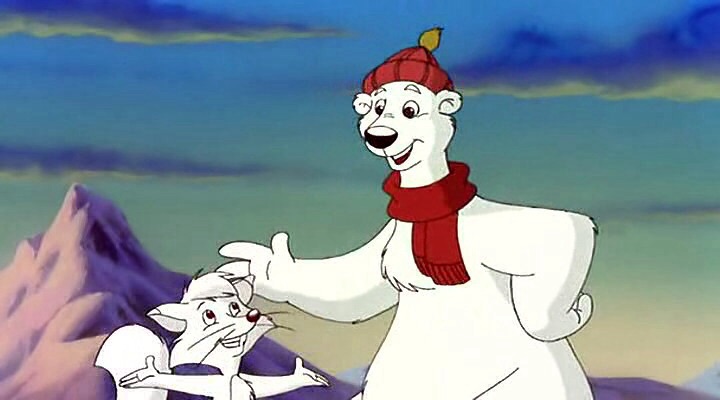
Aiding Rudolph on his journey are two arctic animals. The first out of the two he encounters is Slyly the fox, who's a tough wise guy on the outside but a softy on the inside. Nothing about his character comes across as anything special. The only thing that makes him entertaining is Eric Idle's performance, who gives the character the most British sounding Brooklyn accent imaginable, but at least he seems to be having fun with the role like Goldberg is. Eventually the two come across a Polar Bear named Leonard when searching for shelter, who really doesn't contribute anything to the story. He's just pretty much there just so that the film can sell an extra toy when marketing the film. And it's a real shame too because they hired Bob Newhart to voice him, who gives the character a gentle presence from the sound of his voice, but he has nothing to really work with for the little he does and speaks. I'll give him this, though he's entirely pointless, he at least does more when compared to Stormella's Penguin butler, he just sort of stands around most of the time simply commenting on Stormella's evil, rather than doing something productive. As if the film doesn't have enough sidekicks, back at the North Pole we have the Pippin and Mary of Santa’s elves Boone (voiced by Richard Simmons) and Doggle, who aren't funny, but aren't annoying either. They pretty much just exist to have provide sort of comedy for the kids before Rudolph meets his friends, and accidentally start problems to create tension for the plot.
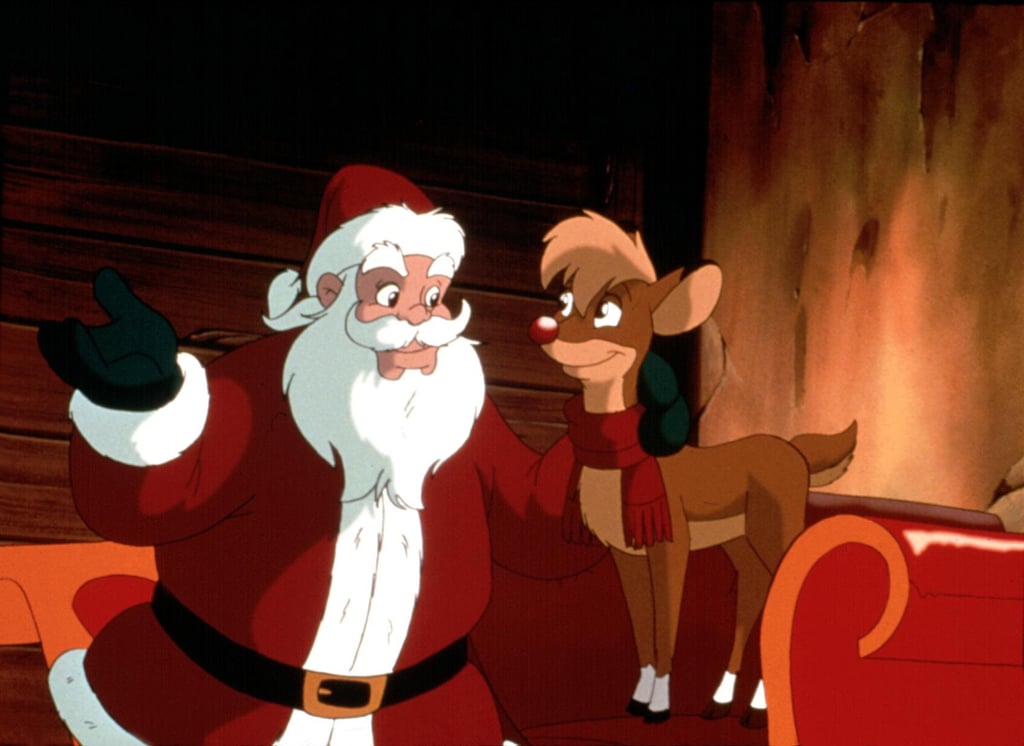
If there is one thing in this film that it does better than the Rankin/Bass special, it's certainly Santa Claus. Let’s not kid ourselves about Santa in the stop-motion special. He was a jerk! He had a few nice moments where he's jolly and shows care about the children on Christmas. But most of the time, he acts like a full himself diva for how rude and whiny he can be, as well as even being dismissive towards Rudolph's shiny nose. The Santa here has none of that. While the other Santa felt like an arrogant coach, the Santa here feels like a cheerleader with high-spirits. Every scene he's in he's acting jolly and humble while always showing support to everybody who lives in the North Pole, no matter if they look different or made big mistakes. The only time he ever acts tough is when he's standing-up for someone else. That's exactly the kind of Santa that I believe most people think of when they hear the big man's name. What makes the character come across so strong is John Goodman's voice work for how big and booming his voice and performance is to make him sound like he's a man full of cheer, while also showing a gentle sincerity to his character to make him feel down to earth. His best moment is when he first encounters a down and out Rudolph, by giving him a gift and lifting his spirits up through a motivational speech that sounds like it comes from his heart instead of coming across as pretentiously corny. His wife is just as lovably sweet as he is, thanks to Debbie Reynolds' warm delivery. But I'll admit that as nice as her voice sounds, acknowledging the fact that she also voices Rudolph's Mom and his school teacher it gets distracting for how distinct her voice is.
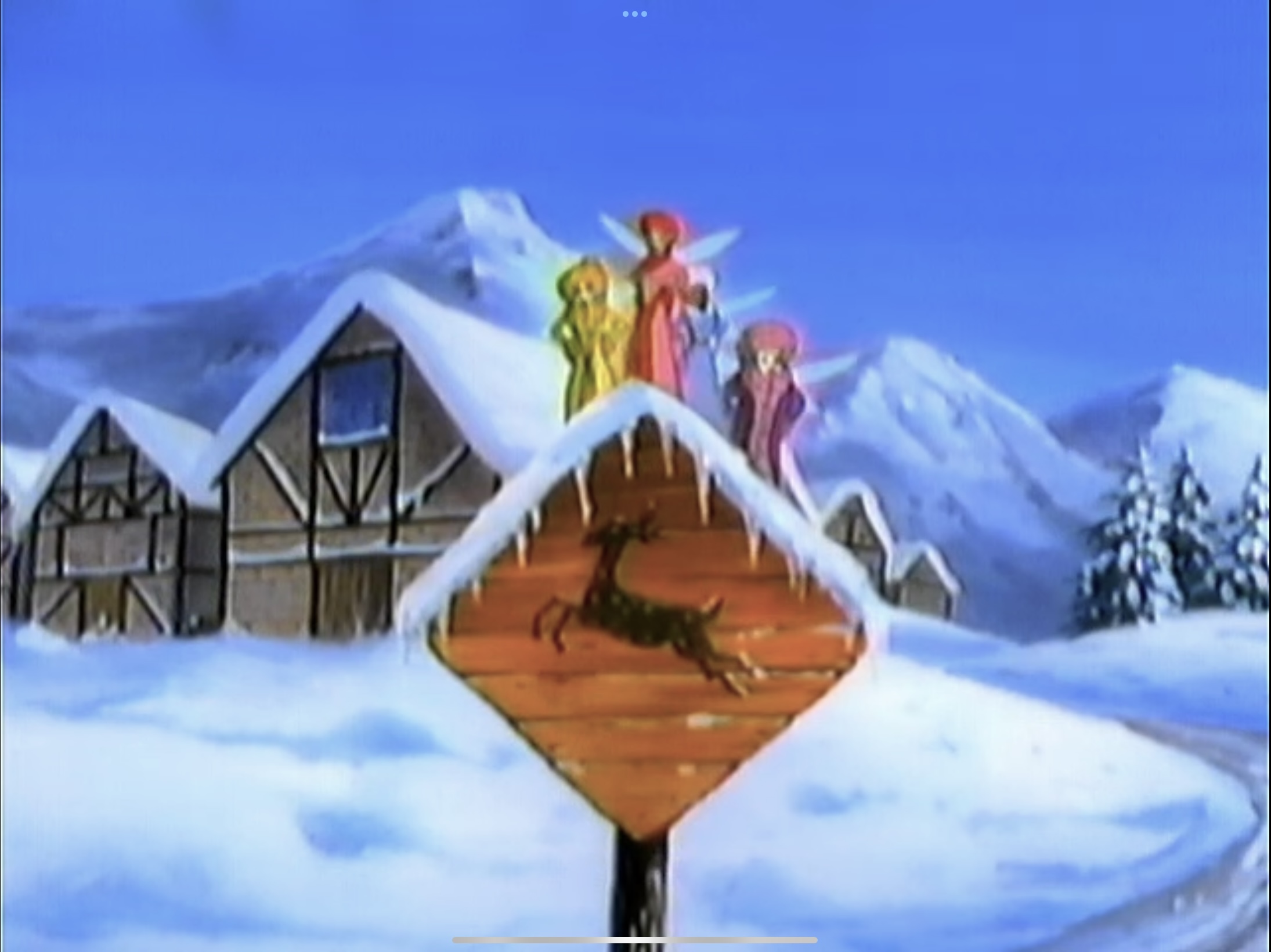
Part of what of made the 1964 Rudolph a household classic was that it had a snowman narrator voiced by Burl Ives. Ives had an innocent grandfather like personality to make you feel warm and cozy around him (even if his design is still a bit creepy) while listening to the story. In addition, when it came to singing most of the songs in the special with his beautiful voice, you felt like singing along with him as if he was leading Christmas carols at your own home. This version provides us a Greek chorus of narrators of beautiful fairies who are the Northern lights. The idea of giving the North Pole's northern lights a personality is an inventive idea. Only rather than the characters feeling as naturally wholesome as Burl Ives was, these characters feel like they're forcing their whimsical charm on you as much as Mary and Tom did in "Babes In Toyland" for how smiley and incredibly corny their singing and personalities are. In the name of Christmas, they make Barbie seem less perfectly obnoxious for how unnaturally glamorous they are!
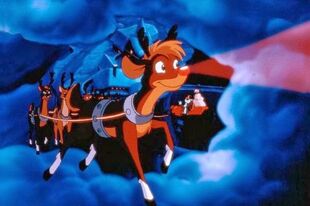
Ignoring the 30 second long songs that the sprites sing to give exposition that are once again presented as obnoxiously whimsical, the title song is sung by Clint Black instead of the sprites (odd that they never sing the full song because they're...oh I don't know, the narrators. Can you imagine if Burl Ives didn't sing Rudolph in the 64 special and instead played the classic the Gene Autry version over the credits? It doesn't sound logical considering he's the one telling the story and singing half of the songs.). Black's voice is fine, but the style is an odd mixture of country and swing that doesn't fit well together. The presentation of the opening credits when the song is played isn't anything captivating either, it's just watching the snowfall with Santa's workshop being shown far from a distance as the scene never changes angles or gets creative when showing each piece of credit. It has the charm of looking at a screensaver. It looks nice at first, until it gets boring after 15 to 25 seconds. The song is sung again at the very end of the film with the whole cast, that's an adorably sweet finale for how cute the choir for it is as everyone cheers and embraces Rudolph for his nobility. Goodman himself knocks the entire choir out of the park for how he sings the lyric "Rudolph with your nose so bright, won't you guide my sleigh tonight" with so much passion he puts into it.
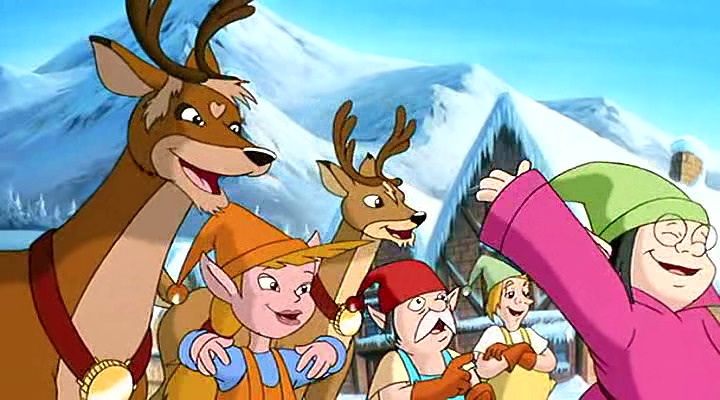
The first original musical number that the film presents is "What About His Nose" where Rudolph's parents express their love for him and wonder what to do with his nose, as everyone in the village teases him about his nose (which by the way, they're teasing a baby, who the hell does that). A part from the chorus bits, the song itself is quite bland and lacking of emotion whenever the parents sing. To fill-up the run time and to try to out-do the classic "We are Santa's Elves" song, there's a musical number involving the elves making toys titled “Christmas Town". The visuals for how they work at the workshop are engaging enough for the scene to be entertaining, as the song itself is quite catchy. Unfortunately, the dubbing for the singing elves is quite laughable for how obvious that they're dubbed by the Pointer Sisters, which makes them all sound like females. The scene itself even carries the most questionable part of the whole film for me, and that's when an elf shows Santa a music box full of ant-sized elves (who are the exact same designs as the regular sized ones) making toys in a mini factory. Why are there mini versions of the same exact elves? Are they clones? Are they supposed to be toys (they certainly don't look or act any different in-spite of their different size)? Where do the tiny toys they make go? Why are they kept inside a tiny box? How do they live? What's Santa going to do with them? The questions for this bizarre choice are practically endless and may actually make for a much more fascinating story, as opposed to lazily retelling a story that we already know.
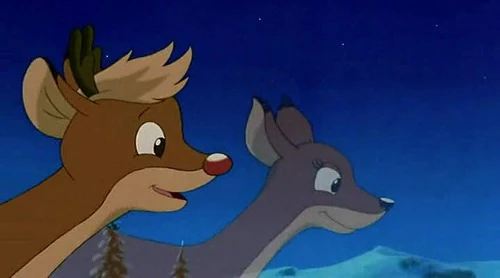
Goodman gets his own musical number called "Santa's Family" to motivate Rudolph, and though Goodman's singing isn't exactly good, I can't help but still find his passion of portraying Santa to be heartwarming. It impresses me how good of a Santa he is, even if we weren't going to compare the Santa from the other version. The song itself pretty much suffers from the same pros and cons as "What About His Nose" had in terms of melody. And unlike how the previous musical numbers offered some kind of visual appeal, this mostly just shows Rudolph and Santa walking around, that isn't really that fun to look at, nor does the animation express any kind of emotion in their faces to keep you hooked. Eric Idle gets his shot at singing for this film, who also sings a motivational song for Rudolph called "It Could Always Be Worse". This is one of the songs in the film that I find myself remembering, but watching it again, it's pretty lackluster. Idle tries to give the song his best, only it seems that he's so stuck with providing a fake Brooklyn accent while trying to remain in character that he couldn't go as all out as he normally would. The lyrics are also cheesy; the limited movements hold back the energy that it's trying to go for; and those singing Vixens that randomly show-up are just very odd looking, almost as if they look like clones of Slyly in drag. I should note that for some unexplained reason in the DVD releases of the movie, the moment when they are attacked by snakes and bees when they imagine themselves being lost in the desert is cut. However, if you pause it before the scene fades back to reality (I suppose) you can see a tiny bit of these vicious threats approaching them. As far as I know, you can only see that image on VHS since that's where I saw the clip from (what exactly is it with DVD versions of straight-to-video films randomly cutting out scenes that were featured on VHS). The villain of course gets her own song, only Whoopi Goldberg doesn't do her own singing, and it is obvious. Like half of the songs in the film, it's tuneful, but contains corny lyrics and out of nowhere visuals of footage being lazily recycled, and Stormella pulling pranks on Santa (with no indication if they are flashbacks, or her imagination) when we're not watching her sing. Being made in the 90s where love ballets were a big deal in animated films, this film provides one involving Rudolph and Zoey singing "Show Me the Light" as they are far apart from each other. It's a nice song that doesn't come off as dull or annoyingly forced as songs like "Where are You Christmas", "When Christmas Comes to Town", and "When Love is Gone", except that it's a bit generic for how much it sounds like the love ballets you'd hear back in the 80s like "Somewhere Out There", and "Time of My Life". As a matter of fact Bill Medley and Jenifer Warnes who sang "Time of My Life" team-up again to sing "Show Me the Light" during the closing the credits. No wonder why it sounds like an 80's love ballet. The sequence itself (incase you haven't already guessed) plays itself similar to when Tanya and Fievel were singing "Somewhere Out There" in "An American Tail". And out of all the terrible dubbing for the singers, this is the worst, because Rudolph and Zoey sound nothing like their speaking voices. Rudolph's dubbing especially comes across as the most distracting where he goes to sounding like the classic Rudolph, to then sounding like a teenager who just went through puberty. It's that bad!
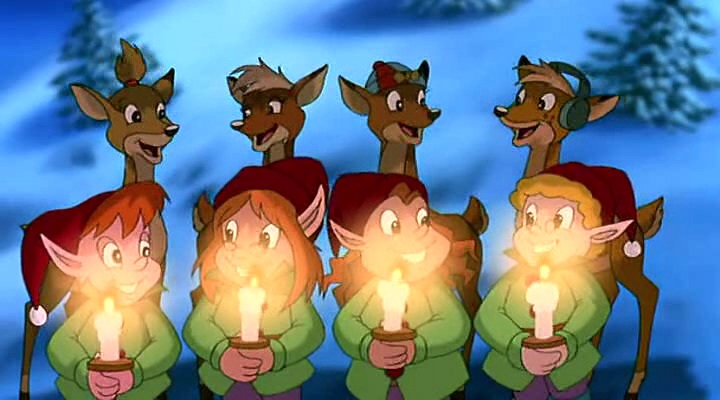
Just when you think the film isn't already trying hard enough to sell a soundtrack, we get two pop songs that are played in the background for drawn-out sequences dedicated to them. When Rudolph guides Santa's sleigh through the storm we hear a motivational song called "We Can Make It" by Johnny Tillotson, which is honestly not a bad song. It has a nice mix between pop and a bit of an oldies Rock N Roll feel to it; contains powerful singing that fits the emotion that the scene is going for; and has a killer sax solo. The only downside is the sequence that it's played for is not thrilling enough to make it feel emotional, or enchanting for how lacking the visuals that are trying to put you in state of awe are. And it's a real shame because I can see this song working with this kind of scene. All the songs made for the film are all original recordings with the exception of one, which just so happens to be an overplayed Christmas song that divides audiences and critics greatly "Wonderful Christmastime" by Paul McCartney. I'm one of those people who loves to listen to it almost every day during holiday season (and I'm not ashamed to admit it) for how festive, upbeat, and unforgettable it is! But the use of the song does feel lazily shoe-horned into the movie, as we get a bit of an overlong sequence of Santa getting ready to launch as Rudolph watches. I wouldn't mind it if the sequence had an enchanting weight to it or some kind of style to make it interesting, but it doesn't for how limited the animation is. And you know what, I take it back when I said that "Show Me the Light" has the worst dubbing. It's the second worst, because when the choir of elves and reindeer sing the ding-dong part of the song we hear Paul McCartney's voice coming out of them, which usually has me chuckling a bit for how much it doesn't fit. The elves having the Pointer Sisters voice is less noticeable when compared to this.
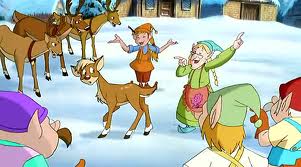
Based on how I talked about the animation for the musical scenes being so lacking, it shouldn't be surprising that the film's animation is not very good. The designs for the characters are cute and distinct, the colors are bright and the landscapes are fairly nice; however, there are way too many problems with the animation to cover. The movements for instance are stiff and many times unnatural. Sometimes they'll move fast to the point where it seems that the film is glitching. Other times they'll randomly cross-their eyes. Many times, they'll stand in one place moving on a loop where it's hard to make-out what they are doing. And most of the time their facial expressions barely change during a scene for how frozen they are, and when they do, it looks so exaggerated that it's awkward. It's good that the designs prevent the film from looking ugly, as well as the film looking like it's on the same slightly higher straight-to-video budget as "Babes in Toyland" to keep it from looking cheap. But that doesn't mean that those elements are good either, because the film still looks generically unimaginative, which overall is quite boring to look at, where the only type of audience who would chew-it up are little kids.
OVERALL THOUGHTS
I feel that the reason why this film gets so much hate is not for being offensively bad, but just for being a very lacking and uninspiring retelling of a classic story that has no reason for it to exist at all. There are countless animation errors; way too many story elements taken from the 1964 special; the songs are a mess and mainly exist so the film can sell a soundtrack; and the characters are nothing special for how lazily they're written. I know the Rankin/Bass Special wasn't the best with story and had stiff and clunky stop-motion animation too, but what made it great was how inspiring it was! It crafted a style and world of its own that has left a large legacy for how creative and different it looked from other Stop-Motion cartoons at the time; contained great songs; characters that weren't the best written but still memorable, fun, and relatable; and made the situations that each character faced feel brutal where their happy endings feel earned. This is just a retrend of it, just minus the creativity, effort, and uniqueness where it leans more on the safe side with the half-baked effort it has, which is a pity too considering the fact that it has a longer running time than the special it's stealing from. Sure, little kids will like it fine, but why bother showing it to them when there are already two other versions that are better than this? Objectively this is a bad movie, however with that said; I personally still have a soft spot for it. This is one of those bad Christmas flicks where I'm purely wearing the nostalgia goggles. Unlike other bad Christmas specials and films that I grew-up watching and dismissed when watching them at an older age (like "Frosty Returns", "The Nuttiest Nutcracker", and "The Grinch" with Jim Carrey), I can't find myself despising this film as much as I did with the others. There's just such a strong harmless innocence surrounding the film that I still find to be inviting, where I feel a lot of that comes from the voice acting and the character's cute designs. As bad as the script is, there is a feeling that the actors are trying to make it work (especially from Goodman and Barr). And as clunky as the songs are, I still find myself humming most of them (mainly the chorus bits). Now if I didn't grow-up with this film, I'd most likely consider it to be pointlessly bad, and even from a nostalgia standpoint I don't find the film to hold-up as well due to the many problems that I criticized it for. While I'll definitely be watching the other versions of Rudolph more times than I do this one, I will still look at it every now and then to relive an innocent time of my life where I had my first full taste of a Rudolph story being told through moving pictures. Nostalgia aside it's not worth your time, but if you're remotely curious in seeing it, it's most likely not going to offend you, but not going to leave you with enough things to make you want to return to it.
OVERALL THOUGHTS
I feel that the reason why this film gets so much hate is not for being offensively bad, but just for being a very lacking and uninspiring retelling of a classic story that has no reason for it to exist at all. There are countless animation errors; way too many story elements taken from the 1964 special; the songs are a mess and mainly exist so the film can sell a soundtrack; and the characters are nothing special for how lazily they're written. I know the Rankin/Bass Special wasn't the best with story and had stiff and clunky stop-motion animation too, but what made it great was how inspiring it was! It crafted a style and world of its own that has left a large legacy for how creative and different it looked from other Stop-Motion cartoons at the time; contained great songs; characters that weren't the best written but still memorable, fun, and relatable; and made the situations that each character faced feel brutal where their happy endings feel earned. This is just a retrend of it, just minus the creativity, effort, and uniqueness where it leans more on the safe side with the half-baked effort it has, which is a pity too considering the fact that it has a longer running time than the special it's stealing from. Sure, little kids will like it fine, but why bother showing it to them when there are already two other versions that are better than this? Objectively this is a bad movie, however with that said; I personally still have a soft spot for it. This is one of those bad Christmas flicks where I'm purely wearing the nostalgia goggles. Unlike other bad Christmas specials and films that I grew-up watching and dismissed when watching them at an older age (like "Frosty Returns", "The Nuttiest Nutcracker", and "The Grinch" with Jim Carrey), I can't find myself despising this film as much as I did with the others. There's just such a strong harmless innocence surrounding the film that I still find to be inviting, where I feel a lot of that comes from the voice acting and the character's cute designs. As bad as the script is, there is a feeling that the actors are trying to make it work (especially from Goodman and Barr). And as clunky as the songs are, I still find myself humming most of them (mainly the chorus bits). Now if I didn't grow-up with this film, I'd most likely consider it to be pointlessly bad, and even from a nostalgia standpoint I don't find the film to hold-up as well due to the many problems that I criticized it for. While I'll definitely be watching the other versions of Rudolph more times than I do this one, I will still look at it every now and then to relive an innocent time of my life where I had my first full taste of a Rudolph story being told through moving pictures. Nostalgia aside it's not worth your time, but if you're remotely curious in seeing it, it's most likely not going to offend you, but not going to leave you with enough things to make you want to return to it.
No comments:
Post a Comment